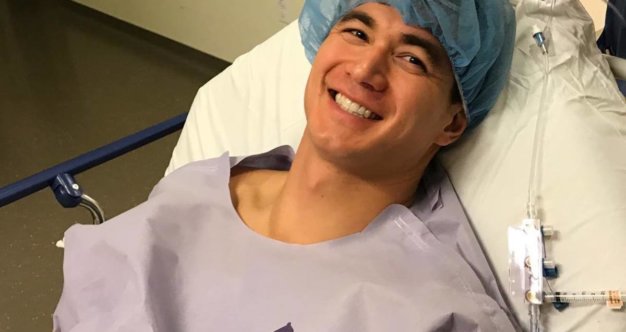Nathan Adrian is one of the best athletes on the planet. He’s won eight Olympic medals in swimming, five of them gold. Now he’s fighting testicular cancer, and wants to raise awareness for the disease.
Read More
We don’t know the details of Adrian’s case, but we do know that for many men diagnosed with testicular cancer, the disease is still a source of shame. “Going to the doctor — men typically don’t go. I don’t know why is the main reason. Women always go. Maybe it’s they don’t want to have their testicles checked,” says testicular cancer survivor Todd Rosenbluth. “[My wife] said ‘listen, I go to the doctor every year, everyone goes to the doctor every year. Just go. You spend an hour doing fantasy football a day, why can’t you spend an hour and go to the doctor?'”
“Luckily when I caught the testicular cancer it was so early that I’m totally fine to this day, and it’s because of her,” he says. “Testicular cancer is 99 percent curable if it’s caught early enough, and the only way to catch it is self-exam or go to the doctor. If you’re worried, don’t be ashamed, guys. Go to the doctor.”
Tripp Hornick on the dealing with the shame that may come with testicular cancer
“Shame is an important topic when it comes to cancer,” says testicular cancer survivor Tripp Hornick. “I think the most important thing is not to become a victim, and not to empower yourself as a victim. There’s nothing good and nothing positive about sending a message as a victim and a culture or victimhood. The way to turn the shame upside down if you have it, is to show how strong you are.”
“Those of us, the vast majority of people who have had cancer, and then have gone on to live very successful and happy lives, listen to those people, listen to us, listen to yourself,” Hornick says, “What you accomplish is what cures any possible shame that could be out there.”
“Testicular cancer is rare, accounting for about 1% of all male cancers. However, testicular cancer is the most common form of cancer in men ages 15-35,” according to the Testicular Cancer Society. “Testicular cancer is one of the most treatable cancers, especially if caught early. If caught at an early stage, before it has spread, the survival rate is almost 100% but if caught at a late stage the rate drops to less than 75%.”
“Certain conditions such as undescended testicle(s), abnormal testicular development and a family history of testicular cancer may increase the odds of developing testicular cancer,” says the TCS. “It is Important to remember that many men who develop testicular cancer have no risk factors at all.”
Learn more about SurvivorNet's rigorous medical review process.


